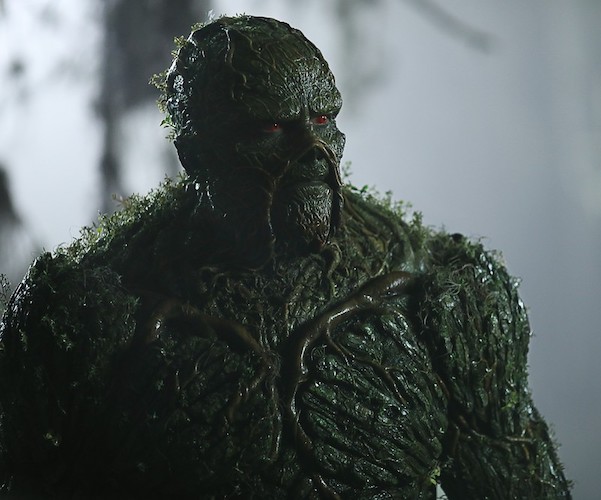Television Review: “Swamp Thing” — I Think We Love You?
By Sarah Osman
Swamp Thing is downright ornery, at times questioning political and corporate power as well as environmental protections.

Swamp Thing — will he survive on the CW?
When considering the expansive DC Universe, Swamp Thing isn’t the first thing that comes to mind. The humanoid/plant creature first appeared in the ’70s (hey, his name says it all — he’s a swamp thing). The figure was quite popular during the ’70s and early ’90s, the star of a couple of films and a few TV shows. However, he’s never been quite as adored as some of the other DC heroes, so it was somewhat surprising that the DC Universe streaming service decided to devote a series to him. Perhaps audiences questioned the move, because the show was canceled after a single episode. But then the CW swooped in and resurrected it. Did the CW have a green thumb? Can the big green man lose his toxicity? Could he catch on? Might Swamp Thing be the Green New Deal?
To its credit, Swamp Thing brings with it an origin story that is a bit darker than your average CW hero show. Starring Crystal Reed as Abby Arcane, the series opens up with Dr. Arcane and her partner Harlan (Leonardo Nam) summoned to Marais, a bayou town the female scientist happens to have hailed from. A mysterious swamp-borne illness has hit the town and the docs from the CDC are expected to discover a cure. This poses a psychological struggle for Dr. Arcane, who left Marais 14 years earlier because of a tragedy involving the death of her best friend.
While trying to find a cure, Dr. Arcane encounters Alec Holland (Andy Bean), a scientist working for Avery Sunderland (Will Patton), who is trying to find out why strange things are happening in the swamp. At the same time, Dr. Arcane reunites with her journalist friend, Liz (Maria Stern), and her police friend, Matt Cable.
Given the presence of all these supporting characters, Swamp Thing turns out to be a slow burn. The pilot takes its time introducing the Swamp Thing. And the run-up to his appearance is a drag. Yes, there are some eerie scenes in the swamp that set up an appropriately ominous tone, but Holland’s and Reed’s chemistry is lackluster and the hospital scenes feel more like lab meet-ups in a lo-cal medical show. But after Swamp Thing stomps in the show’s pace picks up considerably.
Jump scares are scattered throughout the series, and they were startling enough to keep me attentive. The later episodes begin to pile up additional mysteries: what exactly is Sunderland up to? And why does his wife (Virginia Madsen) hate Dr. Arcane so much? Patton brings the right amount of menace to Sunderland, and Madsen embodies the intense passion of a scorned woman. The scenes shot in the swamp are frightening highlights: watching various characters pulled down into the moss is downright disturbing. And that creepy crawly quality is just right because Swamp Thing isn’t as lighthearted as other DC shows. In fact, it is downright ornery, at times questioning political and corporate power as well as environmental protections.
You can’t help but regret that the show did not air on the DC Universe, though. The characters’ swears are bleeped out and I suspect that the CW cut or altered certain edgy scenes. Still, given its mix of the macabre and social criticism, the series is a usefully distinctive addition to CW’s DC Universe. As of now, there is only one season of Swamp Thing. But, depending on how the mysteries are dealt with and how much darker the narrative becomes, the show may generate enough fan interest to deserve a second one.
Sarah Mina Osman is a writer living in Los Angeles. She has written for Young Hollywood and High Voltage Magazine. She will be featured in the upcoming anthology Fury: Women’s Lived Experiences under the Trump Era.


While not surprising, it is nonetheless disappointing to read that yet again an adaptation of a comic book so identified with Alan Moore’s early career efforts to introduce more adult themes and formal experimentation to the comics medium is succumbing to genre clichés.